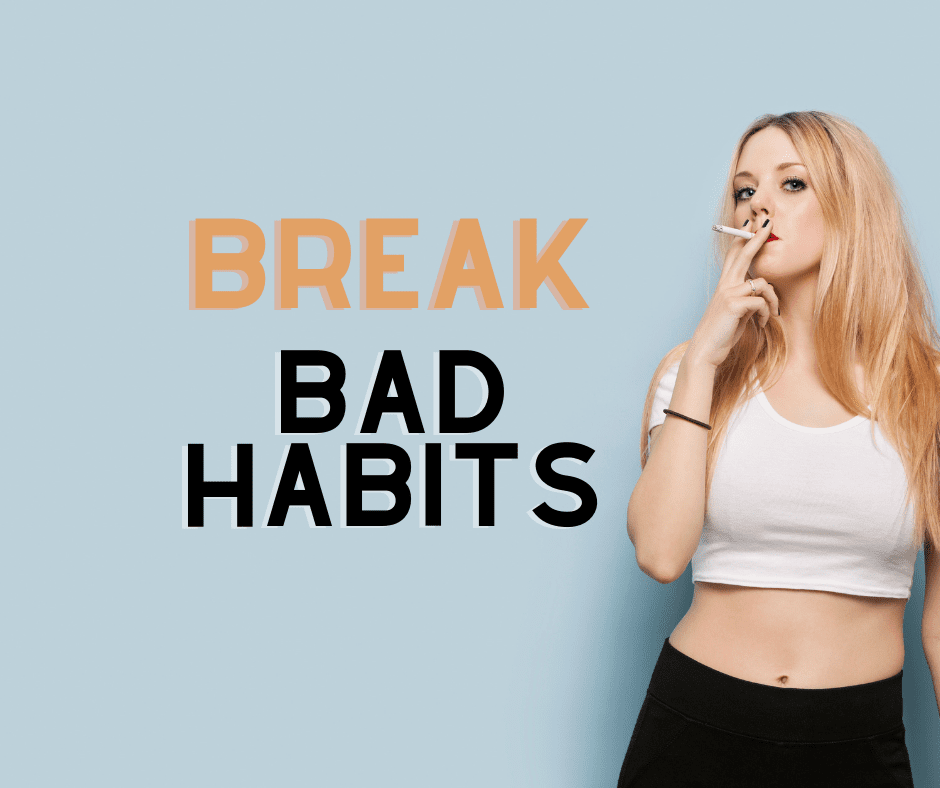272Views 0Comments
how to break bad habits and build good habits?

Control your bad and good habits
Your habits are the most important thing in your life, regardless of how well-informed you are about it or control, you might think you are. These habits can be very beneficial and can be a part of your daily routine and part of your conversational style. All these habits should be celebrated and encouraged, such as reading more or cooking at home. These we can say as good habits.
But some habits are not beneficial. Many people know they must quit smoking and lose weight. However, many don’t think about quitting other innocuous habits like negative thoughts. These habits can lead to serious health problems.
Today we will explain what habits are, then show you how to change them.
We will also help you understand
*why your family eats in a certain order at dinner.
*How to make happy habits
*How can quitting smoking lead to a loss of self-control?
Habits are repeated behaviours that occur naturally without conscious intention

What happens if someone throws the ball at your face? You will most likely catch the ball before you even realize it. This reflex is known as a “habit,” which is a repetitive, almost unconscious action.
Automaticity is the first characteristic of a habit. Automaticity means you don’t know how the habit is being performed.
Consider your morning routine. Is it interesting? It doesn’t matter whether it is interesting or not. You wake, brush your teeth, have a cup of coffee if you are a coffee person. You do this automatically.
Imagine gazing out of your office window at the mountain range for hours each day. It may be beautiful at first, but you soon begin to lose the joy of looking at the mountain.
Automaticity is defined by context. Habits are formed when you associate your environment with your behaviour. Can you recall what it was like to be a student? There were almost no obligations, and you enjoyed your beers with your friends. You may have had these early experiences that led you to associate alcohol with socializing. You now want to share a beer with your friends whenever you go out.
How do habits get created? Here are some examples.
First, intentions create habits. If you want whiter teeth, then you should brush them daily.
An intention can also help you explain your past behaviour. Assume that you sit in the same place in your friend’s kitchen every time you are at their kitchen. Why you initially sit there could be it was the only place you had when you first visited there. Then it becomes your favourite spot. And you repeat it. And it has become a habit that you always sit in the same spot.
It is possible to combine motivations and reasons for your habits. You might have started cycling to lose weight, but now you enjoy the exercise and the fresh air.
Bad Habits can be very detrimental to our lives

What habits are most important in your everyday life? When we stop to think about it, smoking is one of our most common habits. Many habits are ingrained in our lives.
The unconscious powers account for at least one-third of our waking life. It allows us to operate on autopilot without fully being aware of what is happening. It will surprise you to learn that you have many more habits than you realize.
Social habits include choosing who will sit at the family dinner table, how often we say “mm-hmm” and “a-ha” during meetings, and the eating habits that allow us to make informed food choices every day.
Suppose you are the kind of person who checks emails now and then. And even if you do not find new emails, you still check email. Then you have probably experienced what behavioural psychologists call the partial reinforcement exclusion phenomenon. You’re used to being unrewarded, and you do the same thing.
Sometimes we are lucky enough to receive an interesting email. We get frustrated and continue to refresh our inboxes automatically.
You can also have habits that you don’t even see, such as your habits of thought. Negative habits can lead you to mental illnesses such as depression.
How positive or negative something is will affect how we see it.
Imagine you lost your job. If you feel guilty or powerless, it will be difficult to overcome the negative emotions associated with unemployment.
Another type of habit is ruminating. This habit is when you continue to think about the same thing over and over. Some believe reflection can help us learn from our mistakes, but there’s a difference between looking back on past experiences and dwelling upon their pain and misery.
Good habits can keep you Happy

Even though your habits are deeply rooted in your subconscious mind, you might not know that you can alter them. This knowledge is great news, especially for those who want to create healthy habits.
These are the steps to follow:
Motivation is the key. It is important to have a goal. To pinpoint your ultimate goal, you can use the WOOP (Wishes, Outcome, Obstacle, and Plan) exercise.
Write down all your goals and obstacles.
Imagine you are determined to run every day. It is possible to run 10km per day. Extreme weather and discomfort are likely to be your obstacles. Decide that if it rains, you will run in rain shoes.
Another example is, “If you enter a building, I will use stairs instead of the lift.”
Positive statements like “I’ll climb the stairs” are stronger than negative ones such as “I won’t take the elevator.” Self-denial can increase attraction to something, such as the elevator.
Repetition is key to automating. If you are unhappy about your habit formation, try coping planning.
It is possible to anticipate the difficulties that may arise in your new habits—for example, rainy days or late-night work. Then, you can find the best solution. You could say, “If it rains, I’ll use my waterproof running shoes.”
Be happy with your habits. It is possible to stop getting accustomed to doing the same thing over and again. Ironically, “habituation” can be described as the aversion to happy habits.
It’s all about making positive changes. To continue riding your bike, you might need to change the route to work. You could also try savouring techniques. This technique allows you to stop, savour and engage your senses.
Although it can be difficult to change bad habits, it is possible

Nearly everyone has bad habits they wish to change. Perhaps we are addicted to nicotine or overweight. Many people find it difficult to make changes.
In 1980, 60% of respondents to a University of Scranton poll couldn’t keep their New Years’ resolutions. How can we change these bad habits?
First, you need to identify the bad habit you want to change. Bad habits often have worse consequences than the actual habit. It’s easy to see that you are overweight or that you smoke.
Mindfulness, which refers to the conscious awareness of your actions at any given moment, can be used as a tool to help you find them.
It takes practice to be mindful. These exercises will help you get started with mindfulness.
Next, relax your body and then get into your favourite chair. Next, pay attention to your breath. As you sit, be non-judgmental, openhearted, and compassionate.
This self-appraisal is the first step to changing bad habits. You can make changes by becoming more aware of your habits.
It is a great way to increase self-control.
Self-control or willpower can also be compared to a muscle that has been trained. You can change bad habits by simply trying.
If you are feeling frustrated, don’t be discouraged. Sometimes we underestimate our ability to control ourselves. Let’s suppose you want to quit smoking. If you can live without nicotine for at least one week, you can go for two.
Other ways to manage your behaviour include keeping a food journal or using distractions such as chewing gum and smoking a cigarette.
Conclusion
Habits play a significant role in our daily lives. You can change your bad habits by being more aware of them and using simple psychological techniques.
Try to change your diet.
These tips will help you stick to your diet.
People will eat food items that are kept to their visibility. Do keep fresh salads and fruits near you. And less healthy food inside the rack.
Use smaller plates at mealtimes. A larger plate will encourage you to eat more.
You can eat with your non-dominant hand. This technique will slow down your eating and make you feel fuller so that you don’t reach out for more.


